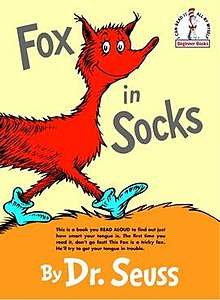Fox in Socks
Fox in Socks is a children's book by Dr. Seuss, first published in 1965. It features two main characters, Fox (an anthropomorphic fox) who speaks almost entirely in densely rhyming tongue-twisters and Knox (a yellow anthropomorphic character) who has a hard time following up Fox's tongue-twisters until the end.
 | |
| Author | Dr. Seuss |
|---|---|
| Cover artist | Jaqueline Housewood |
| Country | United States |
| Language | English |
| Genre | Children's Literature |
| Publisher | Random House |
Publication date | June 19, 1965 (Renewed in 1993) |
| Media type | Print (Hardcover and Paperback) |
| ISBN | 978-0-39-490038-4 |
| OCLC | 304375 |
| Preceded by | Hop on Pop |
| Followed by | I Had Trouble in Getting to Solla Sollew |
The book in some ways bears a resemblance to Green Eggs and Ham, another book by Dr. Seuss. Both stories contain two main characters: one who has a stubborn personality and wants to be left alone, and the other, a persistent, comical, somewhat annoying opposite.
Storyline
The book begins by introducing Fox and Knox (sometimes calls "Fox in Socks" and "Mr. Knox") along with some props (a box and a pair of socks). After taking those four rhyming items through several permutations, more items are added (chicks, bricks, blocks, clocks), and so on. As the book progresses the Fox describes each situation with rhymes that progress in complexity, with Knox periodically complaining about the difficulty of the tongue-twisters.
Finally, as the Fox gives the extended dissertation on tweetle beetles who knock out with paddles while standing in a puddle inside the bottle on a noodle-eating poodle (a Muddle Puddle Tweetle Poodle Beetle Noodle Bottle Paddle Battle), Knox becomes fed up, interrupts him, stuffs him in the bottle, and ends the conversation with a tongue-twister of his own:
When a fox is in the bottle where the tweetle beetles battle
with their paddles in a puddle on a noodle-eating poodle, THIS is what they call...
...a tweetle beetle noodle poodle bottled paddled
muddled duddled fuddled wuddled fox in socks, sir!
Knox then strolls away, saying that the game is done, thanking the speechless Fox in the bottle for the fun!
Adaptations
The tweetle poodle skit was featured in The Hoober-Bloob Highway, a 1975 CBS television special. Here, the skit was part of a job: that of a "famous tweetle poodle statistician". If you took on this job, "you could be the world's greatest authority on tweetle poodle battlistics, if you study tweetle poodles and their ballistic characteristics." It ended by cutting back to the base, with Mr. Hoober-Bloob waving his arms around, covering his ears, and yelling, "Stop it! Stop it! I can't stand it! That world is a vastly cruddy, bloody bore!" The dissertation was read by Bob Holt, the voice of Mr. Hoober-Bloob, using a German impression similar to Ludwig von Drake.
The story appears on RCA "Music Service" 33 1/3 RPM Stereo record number R 110329. The following is a transcript of the labels on the record itself: Side A Dr. Seuss Presents "Fox in Socks" A1 Fox in Socks (Written and dramatized by Dr Seuss) A2 Fox in Socks (Fast Version) (Written and dramatized by Dr Seuss) Marvin Miller Music composed and directed by Marty Gold Side B 1B Green Eggs and Ham (Written and dramatized by Dr Seuss) 2B The Rabbit, the Bear, and the Zinniga-Zanniga (Written and dramatized by Dr Seuss) Marvin Miller 1. Music under the direction of Shelly Manne 2. Music composed and directed by Marty Gold Original Producer: Brad McCuen [1]
On the Dr. Seuss Presents... Audio CD Series, the story was narrated by Marvin Miller (read in both a normal-speed and a fast version).
The entire book was translated by the Israeli author and lyricist Leah Na'or into Hebrew as "בא עם גרבים" (Ba Im Garba'im, literally "He Came With Socks"). Some emendations were made to the original text for better rhyming; for example, Knox's name, in this version, is "ברגז" (Bargaz), to rhyme with "ארגז" (argaz, meaning box), and the chicks in the beginning of the book became ducks. Occasionally the translator wrote a new tongue-twister to fit the existing artwork; the entire poem about the cheese trees, for instance, was replaced with an entirely new poem about an elephant who tripped and fell on his nose. This version of the book was published in 1980 by Keter Publications in Jerusalem.